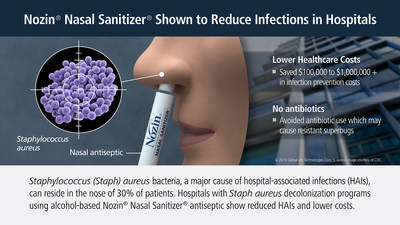Results announced in a symposium at the June 2019 conference for the Association for Professionals in Infection Control (APIC) showed alcohol-based nasal antiseptic programs decreased Staph aureus infection rates in double digits and up to 100% with cost savings ranging from $100,000 to over $1 million annually.
|
BETHESDA, Md., July 18, 2019 /PRNewswire/ -- Results announced in a symposium at the June 2019 conference for the Association for Professionals in Infection Control (APIC) showed alcohol-based nasal antiseptic programs decreased Staph aureus infection rates in double digits and up to 100% with cost savings ranging from $100,000 to over $1 million annually. With the added benefit of keeping patients out of contact isolation for colonization, these Nozin programs also improved patient care and hospital staff satisfaction.
The infection prevention programs utilized Nozin® Nasal Sanitizer® antiseptic, and not an antibiotic, as the nasal decolonization agent (nozin.com). Avoiding overuse of antibiotics is a healthcare priority to help prevent the emergence of resistant bacteria known as superbugs. These clinical results were shared in the symposium titled "An Emerging Standard of Care to Mitigate MSSA/MRSA Infection Risk – Challenging the Status Quo with Strategic Universal Nasal Decolonization". Panelists at the symposium presented data on cost saving and patient safety benefits of Nozin programs. They discussed how an emerging standard of care is to treat hospital patients with the alcohol-based nasal antiseptic, and not with topical antibiotics, to reduce risk of healthcare-associated infections (HAIs). A major cause of HAIs is Staphylococcus (Staph) aureus which about 30% of patients carry in their nose and risk transmitting to others and to their own bloodstream through openings in skin from surgery or intravenous lines. The Centers for Disease Control, in a March 2019 report titled “Staph Infections Can Kill”, warned of the persistent danger from Staph aureus, including from methicillin resistant Staphylococcus aureus (MRSA), citing 119,000 Staph aureus bloodstream infections with 20,000 deaths in 2017. Research shows non-isolated patients receive better care than isolated ones. Caregivers can become fatigued from the frequent personal protection equipment use required to attend to patients in isolation. Costs of isolating a patient can average over $100 a day, contributing to an estimated $1 billion spent annually in U.S. for MRSA screening and isolation of colonized patients. Universal decolonization refers to treatment of all patients, such as in an Intensive Care Unit. With universal body and nasal decolonization used in these programs, hospitals reduce healthcare costs, improve patient safety and address the CDC mandate to fight Staph aureus while having fewer patients in contact isolation. Supporting Quotes
The panelists at the symposium were:
About Nozin Nozin is the leading brand in nasal decolonization. Nozin programs from Global Life Technologies Corp. are empowering healthcare professionals in hundreds of hospitals. Designed to improve care, lower infection risk and reduce healthcare costs, these programs utilize Nozin® Nasal Sanitizer® antiseptic with clinically supported infection control solutions for healthcare facilities, their patients and the providers who care for them. Note: Nozin and Nasal Sanitizer are registered trademarks of Global Life Technologies Corp. All other company and product names may be trademarks of their respective owners.
SOURCE Nozin |





